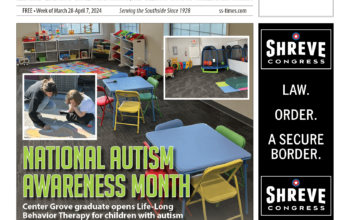By Stephanie Dolan
According to the National Organization for Rare Disorders, Friedreich’s ataxia (FRDA) is a genetic, progressive, neurodegenerative movement disorder. The typical age onset is between 10 and 15 years, but some who are afflicted may not show signs of the disease until their 30s.
Initial symptoms may include unsteady posture, frequent falling and increasing difficulty in walking. Those affected may also struggle with slurred speech, foot deformities and an irregular curvature of the spine. In addition, FRDA is often associated with cardiomyopathy, and about a third of the people with FRDA develop diabetes mellitus.
It affects one in 50,000.
In Greenwood, that one is Tori Schlageter.
Schlageter, 40, wasn’t diagnosed until she was 34 even though she’d already been dealing with symptoms for a few years.
“I started having symptoms in my mid to late 20s and it took a few years for them to diagnose me correctly,” she said. “I was misdiagnosed a couple of times before finally being diagnosed with Friedreich’s ataxia.”
To raise awareness of the disease and raise money for Schlageter’s health expenses, her father-in-law began FA-Indy.

Bob Schlageter, 65, lives just outside of Southport and is preparing for the fourth annual FA-Indy run/walk at 9 a.m. Aug. 17 at Freedom Springs Park in Greenwood.
“Last year we had about 250 people for the run/walk,” he said. “I’m hoping we have around that many this year.”
Who is at risk for FRDA
Bob went into greater detail about who might be affected by FRDA and why they might be afflicted.
“It’s a genetic condition, so you have to have a defective gene from the mother and the father,” he said. “The interesting thing about it is just because they have a defective gene doesn’t mean that every child they have will develop this condition. We know families with multiple siblings and only one has it. Our daughter-in-law is one of three, but she is the only one of the three who has this. Now, another fellow who has this developed the disease in his mid-30s. His brother, though, had it all his life.”
Bob said he started FA-Indy because he was seeing the limitations to the kind of help that people affected by FRDA can get.
“There is help out there but there are limits,” he said. “For example, our friend Tyler had his mobility van stolen. They did find the van, and insurance totaled the vehicle, but they wouldn’t cover the mobility equipment. Money had to be raised separately to outfit the van with new equipment.”

Bob also said that once a patient is in a wheelchair and they’re trying to navigate around a home, things like narrower doorways are a problem. He also mentioned lack of ramps for wheelchairs and lifts for stairways.
“There is nothing out there that helps people widen doorways and create ramps,” he said. “A lot of this has to come out of someone’s family monies. It’s not the fault of these people that they have this condition.”
While fundraising efforts have helped people locally, like Tori and Tyler, Schlageter said that he also sends funds to national Friedreich’s ataxia research organization, the Friedreich’s Ataxia Research Alliance (FARA).
“The Friedreich’s Ataxia Research Alliance is out of Pennsylvania,” he said. “We send a portion of our proceeds to FARA so that they can hopefully find a cure of some sort for this.”
Until then, Tori is plugging along, still moving around without the aid of a wheelchair.
A progressive disease
“It’s a progressive disease,” she said. “I’m still mobile and able to walk, but I’m using assistance now. I have a rollator (rolling walker). I call it my ‘meemaw cart.’ I use that now because my disease has progressed quite a bit over the last year, and I’m struggling with coordination and motor skills.”
Aside from the work her father-in-law is doing with FA-Indy, Tori is thankful to be getting a lot of help from her family, especially from her three boys: Jaron (20), Wyatt (13) and Owen (10).

“They’re amazing,” she said. “They always help me clean up. My youngest one just asked if he could learn how to do laundry, so he’s been helping me by doing that. They’re good about helping me cook or clean up after dinner. And whenever we go somewhere, they’re always helping and getting my rollator in or out of the car for me.”
Tori’s family is also ready to help for the upcoming run/walk at Freedom Park.
“For the walk, my husband, Bobby, and my boys and I will go over to my in-laws’ house, and we’ll get everything ready – the shirts and everything,” she said. “We help set up, but my boys and my husband always go and help out wherever needed. That’s really our biggest event. We did a bake sale last year that one of my friends organized. I made some homemade apple butter.”
Tori also mentioned another big fundraiser that FA Indy is planning for next April.
“Then we’re going to have an event April 25 called FA-Indy Hoe Down,” she said. “We’re going to have square dancing and food and a silent auction. My parents are actually going to put that on. So, I’ve been helping my mom talk to some organizations about donating to that event.”
For more information about these events, find FA Indy on Facebook. To donate or to register for the run/walk, visit faindy.org.
Fourth Annual FA-Indy 5K Walk/Run
Aug. 17, 9 a.m.
Freedom Springs Park
850 W. Stop 18 Road
Greenwood, IN 46143
Tickets: $30 per person or $60 for a family of four or more
faindy.org/events


